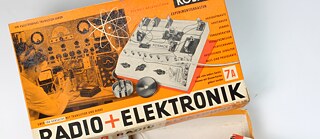Bauhaus-Universität Weimar Transcultural Listening Map

These five snippets are extracts from the “Transcultural Listening Map” compiled by “Experimental Radio” professorship at Bauhaus-Universität Weimar. In her radio stories Nathalie Singer is collecting personal radio memories and anecdotes from various places around the world. The created map will be launched as part of the project “Listening to the World – 100 Years of Radio” promoted jointly by the Goethe-Institut, Bauhaus-Universität Weimar, Deutschlandfunk Kultur and Haus der Kulturen der Welt (HKW). The following snippets take you to Bolivia, Chile, Peru, Israel and the Palestinian Territories. And if you’re in the mood for more, check out the “Transcultural Listening Map”. Have fun!
The following interviews were conducted by Nathalie Singer and Florencia Gurci during the “Bauhaus.Listening.Workshop” in Montevideo and the “Radiogespräche” (Radio Talks) series of lectures in Weimar and compiled by Lefteris Krysalis.
Making sounds with the mouth – memories by Luis Alvarado
 Making sounds with the mouth
| © mauritius images / Pongtorn Hiranlikit / Alamy / Alamy Stock Photos
Luis Alvarado comes from Peru and is a curator for sound art projects. He remembers a radio programme that his father listened to. The producers of the programme had no money for sound effects, so they made the sounds themselves – with their mouths.
Making sounds with the mouth
| © mauritius images / Pongtorn Hiranlikit / Alamy / Alamy Stock Photos
Luis Alvarado comes from Peru and is a curator for sound art projects. He remembers a radio programme that his father listened to. The producers of the programme had no money for sound effects, so they made the sounds themselves – with their mouths.Transcript (translated from Spanish)
Luis Alvarado: The first thing I remember about radio? I have several memories as a child. I have two in particular: My dad waking up in the morning and putting on a news programme, which later became a kind of comedy show. This was when I was ten years old and my dad listened to the news on the radio. There were some comedians who narrated the news, it was a radio station called Radio Moderna. I don’t remember the name of the program, but its on YouTube (the program was called “The good, the bad, the ugly of working day”). But it was very important because it was a very low budget programme. In fact, when you see the pictures of the booth you see a brick wall and they had no money for sound effects. So, as they had to narrate news of accidents or things like that, they made all the sounds with their mouths. And it was an incredible thing that I found both funny and disconcerting. And I always think that must have had some effect on me and my interest in the sound poetry.
Nathalie Singer: Do you have a recording?
Luis Alvarado: Actually, I would like to write something about that, because I think almost all of them have passed away, because they were already old at that time. I think one of them is still alive and in fact I want to interview him and remember him now, because he seemed to me something totally sui generis. In other words, out of the ordinary, they played the sounds of aeroplanes and car crashes. Obviously they imitated every politician there is and they did various voices. They were very, very funny. That’s my first memory.
A trilingual station in Jerusalem – Interview with Bashar Shammout
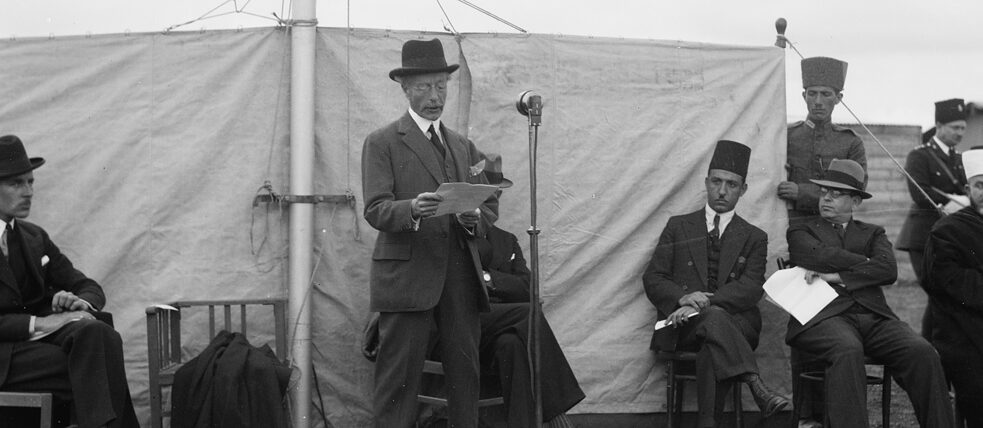 Inauguration of the Palestine Broadcasting Service on March 30, 1936. Governor General Arthur Grenfell Wauchope delivers the inaugural address in Ramallah.
| Public domain; source: Wikimedia Commons
Bashar Shammout is a sound engineer and audio-visual heritage specialist. Drawing on his experience of setting up a radio station for the Palestinian territories in the 1990s, he talks about radio in Israel and Palestine in the 1930s. At first, many amateurs broadcast completely unregulated. Then, in 1936, the British administration established a radio station in Jerusalem that broadcast in Arabic, Hebrew and English.
Inauguration of the Palestine Broadcasting Service on March 30, 1936. Governor General Arthur Grenfell Wauchope delivers the inaugural address in Ramallah.
| Public domain; source: Wikimedia Commons
Bashar Shammout is a sound engineer and audio-visual heritage specialist. Drawing on his experience of setting up a radio station for the Palestinian territories in the 1990s, he talks about radio in Israel and Palestine in the 1930s. At first, many amateurs broadcast completely unregulated. Then, in 1936, the British administration established a radio station in Jerusalem that broadcast in Arabic, Hebrew and English.Transcript
Bashar Shammout: The German government through the Heinrich Böll Stiftung decided to support the Palestinians in order to set up their own electronic media and radio stations. Being Palestinian sound engineer may be probably the only Palestinian sound engineer here in Germany. So I was so lucky to have the chance to go to Palestine and to help setting up the radio station. That was 1994. One or two years later, we switched to the university. We started giving our training program at the University of Birzeit. So the university asked me at that time … to they had the vision. They want to set up a campus radio. I said, okay, good idea. What do we need? Okay, we need a studio and we need a transmitter, F.M. transmitter. So we bought the transmitter here in Germany and we transferred it to Palestine and we started setting up the antenna and said, okay, which frequency? Ok, Whatever you want or whatever we want. So literally we went, you know, we have the old FM radio and we started looking where is a gap where is no signal, okay. So we picked up the signal and then we started we said, okay, this is over 90-something – I don’t remember – megahertz.
So when I did this research, I remember that time people, you know, everyone goes this, there’s no clear regulation at that time in the 1920s, everyone chooses his own frequency. And started transmitting on his frequencies. The same situation was with me 1996 when we picked up this frequency. And then it turned out that this frequency was used by a settler, a Jewish settler, who also was an amateur radio freak at that time and he used to transmit in the evening but at a much higher power. So he overloaded our signal. So then we still needed to change maybe one or two years later, the Palestinian Authority decided that we have to regulate all these things. So they said, okay, this is your frequency. You take this frequency and the others too and well, this is …
So when I did this research, I remember that, you know, these regulations or non regulations. So that was the case in the 1920s, actually all over the world, also in Palestine and then 1936, the British mandate said stop all this amateur radios and all this... We have to make a clear and really solid radio station for the Palestinian people. And it’s a very serious station, not like the amateurs. So they closed all the amateur radio stations and they set up the so-called PBC, ah sorry, PBS, Palestine Broadcasting Service, which was the first radio station in Palestine, but it was the second radio station in Arabic language transmitting from the Arab world. It’s the first radio station was the one in Cairo, which was founded in 1934, and the Palestine Broadcasting Service was the second radio station in the Arab world speaking in Arabic in 1936. At that time you have mentioned that, there were differences. As far as I remember or as far as I know, for Russia, this was transmitting in Arabic at that time over shortwave or middle wave. But I don’t know. But I think the Nazis did also some Arabic program at the time, but not from the Arab from within the Palestinian or the Arab world. Yeah, exactly. So this radio station is a very remarkable thing. The radio studios were in Jerusalem and the transmitters were in Ramallah. Very interesting story because this is a distance of, let’s say, ten kilometers. And they had a line, physical line between the studios and the transmitters. And until today, this main street of the north of Ramallah, which goes to use it, is named the Broadcasting Street, till today. Because the transmitters were standing there and the street was opened to access these transmitters. Now, the entire area here is full with buildings and so on, but it’s still called in Arabic, the broadcasting street, the transmission street.
Nathalie Singer: Can you imagine that this tower was some kind of central in Ramallah now?
Bashar Shammout: Sort of, sort of. Yes, yes.
Nathalie Singer: Was it in the center or more …
Bashar Shammout: Very close to the residence place of Abbas (Mahmoud Abbas). So this is the same route. Yes, exactly. So Ramallah was chosen because Ramallah is a bit higher than Jerusalem. So and they wanted to reach as much as they can in the region.
Nathalie Singer: How far did they reach?
Bashar Shammout: Well, they reached actually to Cairo, Egypt, Cyprus, southern Turkey, Jordan, Syria, Lebanon, anyway. Yes, this entire area actually, they transmitted over the middle wave.
And they had...
Actually it was a radio station and it was three radio stations in one. Why? Because the British decided, you know, Palestine was, as I said at the beginning, it was it consisted of different ethnic groups, the Arab Palestinians, Muslims and Christians, and then the new comers, the Jews from Europe, they were coming to Palestine. So and they spoke Hebrew at the beginning and then there were the British soldiers and the British presence in Palestine. So that’s why this radio station was actually transmitted in Arabic, in English and in Hebrew. And the three languages were by Arabic was the major language. And this is also a very interesting thing that the radio, the Arabic program was named Palestine. No, here is Jerusalem. That was the logo this was the signal. So. Here is Jerusalem. And then it goes on the Hebrew program, called Eretz Israel, which says this is this voice of the land of Israel. And then again, English Palestine Broadcasting Service. So there are three different titles, three different names with three different working groups. And actually they shared only the transmitter, the frequency and partly the studios. But the main you have to imagine that the Arab group, which was, you know, making this radio, the Arabic program, were Palestinians. And they had in mind something different than what the British government had in mind. They had in mind that this is the radio station of the Palestinians. And we have a political problem, a political issue that we have to address. So that’s why, there were lots of problems at the beginning between the leadership of the Palestinian, of the Arab group and the British rulers who actually gave green light for the establishment of this radio station. So there was different visions. And the Israeli group had in mind: okay, we are planning to set up our own state. So we have to address our Jewish community to prepare them, how to speak proper Hebrew and to and run the Hebrew language. So it actually it’s very important to understand that these three stations were actually three separate streams, stations with different visions, with different aims, but they were all together under one umbrella. So it’s a very, very strange structure.
The sounds of Hebrew – Ido Ramati
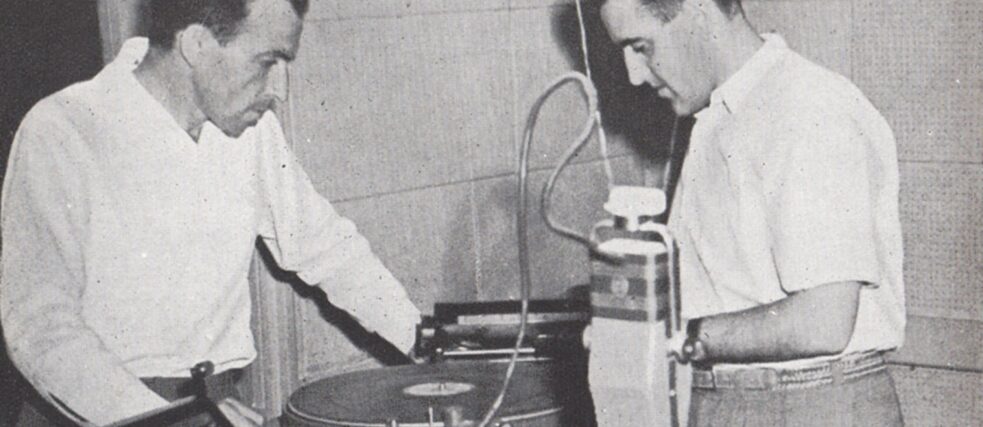 Israels radio broadcast
| Public domain; source: Wikimedia Commons
Ido Ramati, lecturer at the Department of Communication and Journalism and the Program in Cultural Studies at the Hebrew University of Jerusalem, speaks about the role of radio in the dissemination and standardisation of Hebrew language in the 1930s and 1940s. And provides an insight into a chapter of Hebrew’s radio and language history.
Israels radio broadcast
| Public domain; source: Wikimedia Commons
Ido Ramati, lecturer at the Department of Communication and Journalism and the Program in Cultural Studies at the Hebrew University of Jerusalem, speaks about the role of radio in the dissemination and standardisation of Hebrew language in the 1930s and 1940s. And provides an insight into a chapter of Hebrew’s radio and language history.Transcript
Ido Ramati: In 1936, two years later, when Hebrew radio broadcasting started, some radio shows joined these efforts, like the series given by Naftali Hertz Torczyner, or the weekly show called simply Correct Hebrew. These radio shows targeted linguistic issues such as teaching the language to immigrants, correcting pronunciation and grammar, or generally refining the audience’s Hebrew speech. In some occasions linguists and language editors were invited to discuss pressing matters of Hebrew, as part of general educational broadcastings, for example as part of the radio show “hasket ve haskel” (which translates as Listen and Learn).
Hebrew radio was also spreading Hebrew speech in general, undesignated shows. Although until 1948 Hebrew was assigned only a little amount of airtime, still the fact that Hebrew sounds were spread over the radio waves, meant the dispersion of formal Hebrew speech. Its impact can be traced, for example, in the weekly communal listening gatherings offered by “the Battalion for the Defense of the Language”, a voluntary organization that tried to enforce Hebrew in all means necessary, sometimes even by violence.
The felt necessity for fortifying what was considered as correct pronunciation was also a reaction to the immigration waves of the 1930’s and on. In this social context, immigrants, especially the German Jews, were often accused of deteriorating the state of pronunciation and they were mocked for not trying hard enough to speak what was considered as proper Hebrew. The struggle to unify a speech community under one dominant pronunciation, had also some violent sides.
And this may provide us a linguistic context to understand the Sperling recorded Hebrew course. It suggests some fascinating historical evidence to what was considered an imperfect pronunciation of this sort. Let’s hear one recording.
Radio of the Future – Interview with Rodrigo Ríos Zunino
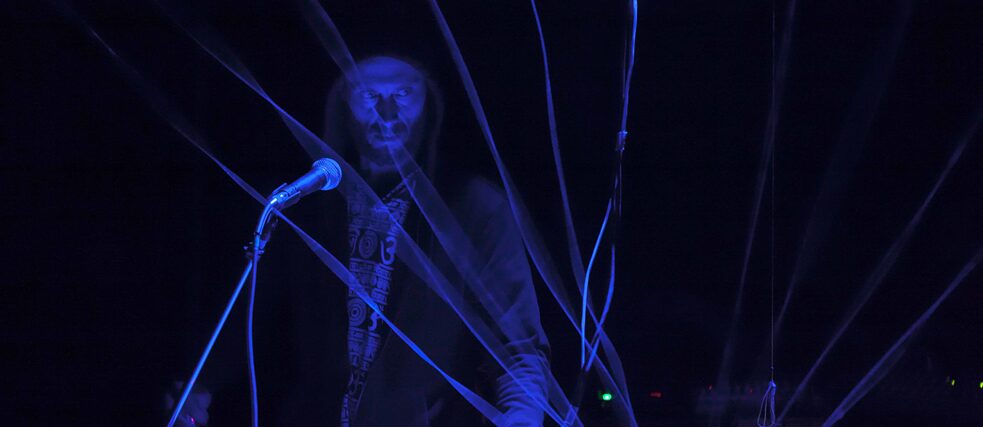 Rodrigo Ríos Zunino
| Photo (detail): © Bienal Internacional de Arte Sonoro Bolivia 2018
Together with Nathalie Singer and Florencia Curci, Rodrigo Ríos Zunino explores how we can use our bodies as antennas and what role the “inner” radio plays in this. Receiving and transmitting are redefined, and a futuristic scenario of radio is sketched out.
Rodrigo Ríos Zunino
| Photo (detail): © Bienal Internacional de Arte Sonoro Bolivia 2018
Together with Nathalie Singer and Florencia Curci, Rodrigo Ríos Zunino explores how we can use our bodies as antennas and what role the “inner” radio plays in this. Receiving and transmitting are redefined, and a futuristic scenario of radio is sketched out.Transcript:
Rodrigo Ríos Zunino : Through my experience I would say that Vedic culture had many ancient practices regarding listening, as the ones that have been used to develop things like deep listening, which is listening within – listening without going further, going left, going right. It is a type of concentration method that helps you develop attention and the movement of energy through your meridians, through your nadis, you can actually do this with your consciousness. But we have been reduced in the way we have been conditioned, because we can actually use all of our body as a huge antenna and decoder that can receive and send information in much better ways than we are able to do through current technologies.
Nathalie Singer: This is what I was thinking when you said like, we can transmit from wherever. Yeah, but you still have these microphones, we have this snaps and everything. And actually in the beginning of the radio they already had this fantasy in the futurism in Russia Velimir Khlebnikov he said we have the mental radio. Yeah. We have an antenna inside and we had the body and one day all Russia will be silent and we will only communicate by the mental and by the waves. It was a very early idea, actually, of the radio. And I think that the radio, the future will come back to this, that actually this will all be gone. And exactly what you just said, it will be something like receiving, learning to receive again and to send out and to be able to transmit, no?
Rodrigo Ríos Zunino: Yeah, my idea of future radio would be kind of mycelial in some way, because it has to have interconnectedness through some type of network. It’s kind of like a radio of radios of sorts, like Indra’s web. Similar to a spider web with small dewdrops on top, where actually in each dewdrop you can see the reflection of all the other dewdrops, this kind of fractal network. But it cannot be sustained through the type of technology we have now, it’s more mental and organic. So maybe we grow some type of contraption, kind of like in “eXistenZ” by David Cronenberg, an organic interface that takes you into the network.
Florencia Curci: Maybe we can do it while sleeping.
Rodrigo Ríos Zunino: While sleeping. Yeah!
Nathalie Singer: The danger is that you cannot switch it out again. Then in the moment where everything gets transmitted and things, this is saying something we still have to consider. We need sometimes to be also off.
Rodrigo Ríos Zunino: We need some privacy filters, perhaps.
Nathalie Singer:v There has to be privacy protection. I mean, you can also imagine it in the dressings, there are a lot of variables already working with transmission. But you don’t want to be all the time under mental attack. So we have to think how to switch it off also. This kind of future radio.
Florencia Curci: True.
Nathalie Singer: But very nice. We could go on because our virus (of radio) is growing.
Nathalie Singer: Thank you very much, Gracias.
Rodrigo Ríos Zunino: Gracias a ti.
Radio in Bolivia – Interview with Guely Morató
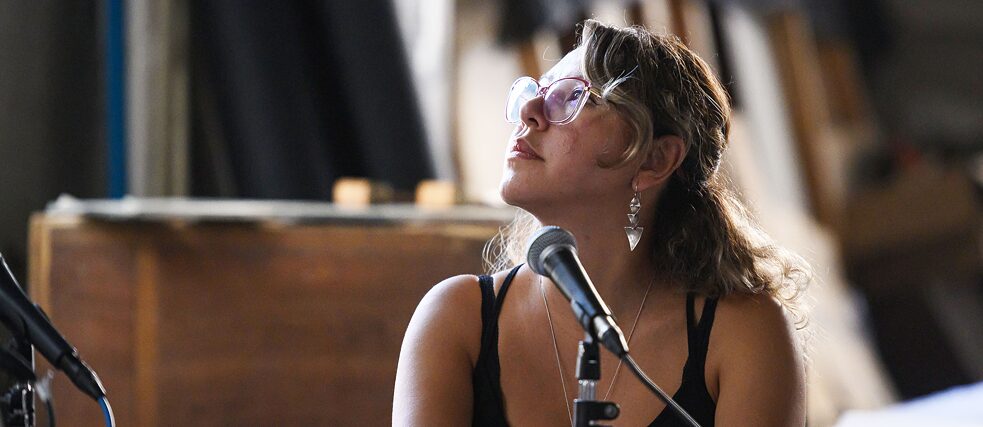 Guely Morató
| © Taruman Corrales
Guely Morató, Florencia Curci and Nathalie Singer talk about the importance of radio in Bolivia. Radio plays a major role in the everyday life of indigenous communities in Bolivia. And mining is an important part of the Bolivian economy. The relationship between mining and radio, and childhood memories of the radio in Bolivia are the subjects of the following conversation, which was conducted in Spanish and English. Guely Morató is a musician and sound artist, Nathalie Singer professor of experimental radio at Bauhaus-Universität Weimar.
Guely Morató
| © Taruman Corrales
Guely Morató, Florencia Curci and Nathalie Singer talk about the importance of radio in Bolivia. Radio plays a major role in the everyday life of indigenous communities in Bolivia. And mining is an important part of the Bolivian economy. The relationship between mining and radio, and childhood memories of the radio in Bolivia are the subjects of the following conversation, which was conducted in Spanish and English. Guely Morató is a musician and sound artist, Nathalie Singer professor of experimental radio at Bauhaus-Universität Weimar.Transcript (translation from Spanish)
Florencia Curci: Interview. Guely.
Nathalie Singer: Hi. Hi. Thank you for coming.
Guely Morato: Thank you for the invitation.
Nathalie Singer: Do you have a first memory of listening to the radio? A first moment?
Florencia Curci: Natalie asks Guely for a personal story about radio and in particular about her first memory of listening to the radio.
Guely Morato: My first memory with the radio has to do with spending the summers at my grandmother’s house, in a little town called Pocona. And at night listening to A.M. radio and finding frequencies from all over the world, going through the dial for Russian radio, Japanese radio, Latin American radio. And that memory of the voices of the world with frequencies, with sounds from other latitudes, reminds me a lot of my childhood and the relationship of this memory with my grandparents, going through these radios looking for signals from other latitudes. It is my first memory with the radio.
Nathalie Singer: This is an international memory, I think, from time to time I need it too, that you could still change and search.
Florencia Curci: A question I asked Alejo was also if you can think of a particular moment, personal or social person of the place where you live, that you feel that the radio was or is the protagonist.
Guely Morato: It was the year 2000 and in Cochabamba a water war had started. The government had made a contract and they sold the city’s water and not even the rainwater could be used without paying a tax to the company that had bought the water. In those terms a demonstration began and the whole town rose up and at that moment there were attacks on some radio stations and I remember that we were listening to Radio Centro, which is a radio station that was transmitting at that moment everything that was happening and suddenly the signal was cut, the signals of several radio stations were cut and at that moment, when cell phones began to appear, the radio became the fastest means of communication. To transmit this news, television had a slower way of working. So it is to start listening to the radios that were cancelled and move around the dial and how they were being turned off generated a very complex moment of tension, where the radios were the protagonist, the protagonists of this. From bringing the news to the people who were not in the revolt. That is a moment that I remember, a bit complex, because my parents repeated, I don’t know, it’s the same as the dictatorships are doing the same as the dictatorships. For us it was new, not for my sisters and me it was new, but we realized that the radio was becoming a threat to what was happening at that moment.
Nathalie Singer: So it was also a really dramatic memory. And this morning you presented all these indigenous radios in other languages and you talked about their importance in the communities.
Guely Morato: In Bolivia. The rural areas have always organized themselves in an autonomous way and the radio was a means in which they sustained their social organisation. Around the 50’s and 60’s the mining radios in Bolivia represented the class thinking, not the thinking more about the rights of the workers, how to organise themselves socially. And the radios became organizing entities. And it democratized this information and this form of education. Because at that time we were forming society in terms of labor law. The mining radio stations have been an important part of that history, of that education of society. And today community radio stations continue to support social organization. Bolivia has 62% of indigenous population. So the need to expand communication in the territory is paramount.
Nathalie Singer: And the mines are extremely important over there? Can you tell us about them in these regions?
Guely Morato: Mining is central to the Bolivian economy. We are a country that exports raw materials and minerals are one of the highest export levels we have in the country. This goes back a long time, since Patiño and the tin mines. The importance of these mines. During the First World War. The Second World War. Then it is constituted as a mining country. That is why the miners became for a long time a very important political fraction in the country. Now, every time it is good to change the situation. There are no other resources, but soon it seems that lithium mining is going to be one of the most important sources of income for Bolivia, for Argentina and for Chile.
Nathalie Singer: And only to know because you talked about the indigenous population and the importance of radio for them and the importance for the mines. But its one by one? The people working on the mines are only from the indigenous populations?
Guely Morato: That it is very usual to see indigenous people working in the mines, that middle class people don’t usually occupy those positions inside the mines, maybe as investors or or owners of the mines, of the mines, but not as workers.
Florencia Curci: Thank you.
Nathalie Singer: And one other question: what does it mean because you had worked a lot with these indigenous people and I would like to know the word “Escuchado, Oír” like what does it mean in other languages. Do you know anything about this? What is the meaning of listening ear for these populations.
Guely Morato: I think more than the literal meaning of the word and its meaning is rather how they manage listening in the good for the good of their community. I think that listening is fundamental because the assembly is very much alive. So the circle that convenes the word and listening to everyone’s opinion and together as a community. Reaching a decision involves a high level of listening and a lot of work to understand and really open up to the needs of the other. Only then can you reach a decision as a community and speak from a collective position, reach that, that political management of their decisions. I think it only happens through a broad capacity to listen to the other, right? [...]


